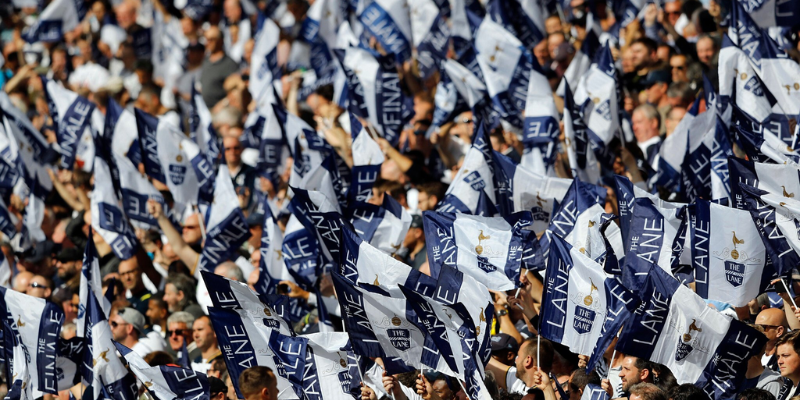One name echoes louder than any other: Spurs. But why exactly are Tottenham fans called Spurs supporters? In this article, AngGoal will accompany you on a journey through history, symbolism, and fan culture to uncover the roots and meaning of that passionate moniker.
Origins of the name “Spurs”

To understand why the nickname took hold, we must travel back to the club’s formation and the language of the era.
The “Hotspur” link
Tottenham Hotspur was founded in 1882, initially simply as Hotspur Football Club. A couple of years later, the club adopted the name Tottenham Hotspur to distinguish itself and reflect its home area. Over time, “Hotspur” became synonymous with the club’s identity.
The “Hotspur” element references Sir Henry Percy, nicknamed “Harry Hotspur,” a 14th-century English nobleman famed for his fiery temperament and militaristic zeal. He was known to spur his horse into action—thus the notion of “hot spurs.” Centuries later, Tottenham would adopt the name and the imagery. esport.com])
Abbreviation and popular adoption
As with many clubs, fans and commentators naturally shortened Tottenham Hotspur for ease. “Hotspur” was clipped down to Spurs, a tidynd distinct nickname that stuck. Over time, it came to represent not only the club, but its supporters as well.
The term “Spurs” is now so entrenched that it is often used in place of the full name. In fact, the club has asked media and broadcasters to favor using “Spurs” or “Tottenham Hotspur,” rather than just “Tottenham.”
Why fans came to be called Spurs supporters

The transition from club nickname to calling its fans “Spurs supporters” is natural but rooted in culture, identity, and language.
Identity through association
When a club adopts a nickname, its fans naturallylow. Just as Manchester United supporters are called “United fans,” Tottenham’s nickname became a badge fans wear proudly—hence, Spurs supporters.
Embracing the label
Over time, fans themselves adopted the title, chanting “Come on you Spurs!” and wearing the symbol on shirts and scarves. The identity becomes collective: to support Tottenham Hotspur is to be a Spurs supporter.
Club reinforcement
The club’s own branding reinforces this association. Official fan groups, merchandise, chants, and the club’s requests to media all lean toward “Spurs,” embedding it dee.
The meaning and symbolism behind “Spurs”
It’s not simply a convenient nickname. The term “Spurs” carries symbolism and emotional resonance for supporters.
Action, drive, aggression

The word “spur” suggests motion, impetus, urgency. It evokes the image of urging on, pushing forward—qualities fans and players associate with attacking spirit, resilience, and intent in football.
Identity and differentiation
In a city with many clubs, being a “Spurs supporter” sets you apart: you are part of a distinct tradition. There’s pride in the term—connected to history, to culture, to passion. Many fans view the label as part of their identity.
Fan culture and chants
The nickname becomes a rallying cry. Supporters chant “COYS” (Come On You Spurs), wave banners bearing the name, and use “Spurs” as shorthand in social media and conversation. Calling fans “Spurs supporters” is just a linguistic extension of that.
Challenges and controversies around the nickname
Even a simple nickname can carry complex baggage. Spurs supporters have faced unique challenges connected to name, identity, and external perception.
The “Y-word” and reclaiming insults
Because Tottenham historically had a visible Jewish following, rival fans often used “Yid” or “Yiddo” as a slur. In response, Spurs fans—Jewish and non-Jewish alike—began to reclaim the word as part of their identity, chanting it themselves in defiance. This has sparked debates over free speech, antisemitism, and acceptable fan behavior.
“Spursy” – an unwanted label
“Spursy” is a derogatory term coined by rival fans and pundits to suggest that Tottenham frequently falters at bad times—collapsing when expected to succeed. It’s used as a mocking shorthand, not a badge of honor. Tottenham and their fans often seek to shake off that label.
Branding and name usage
In recent years, the club asked broadcasters to avoid using “Tottenham” alone and favor “Tottenham Hotspur” or “Spurs.” This kind of branding reinforcement shows how the club wants “Spurs” to be more than just a nickname, but a core identifier.
Why the name endures — and why fans love it
So many clubs have nicknames, but not all see them become part of fan identity. Why does Spurs stand the test of time?
- Simplicity and uniqueness
- “Spurs” is short, punchy, and unique in English football. It’s easy to chant, easy to write, and immediately identifiable.
- Emotional resonance
- The name carries imagery of motion and passion. For fans, it’s more than a label—it’s part of the story they belong to.
- Cultural reinforcement. It’s everywhere, making it self-reinforcing.
- Club backing
- The club’s own push to use “Spurs” in branding and media solidifies the connection between nickname and supporter identity.
Spurs supporters through the decades
How has the identity of Spurs supporters evolved over time?
Early supporter clubs and activism
The Spurs Supporters Club was founded in 1948 and later formally recognized by the club. It organized travel, newsletters, and community among fans.
In later decades, fan groups such as TISA, Save Our Spurs, and The Fighting Cock became vocal in club affairs—protesting decisions, advocating transparency, and representing fans’ voices.
Global expansion
Today, Spurs supporters span every continent. There are hundreds of official supporters’ clubs worldwide,. The identity “Spurs supporter” is now global, transcending geography.
Modern fan identity
Modern Spurs supporters wear the name proudly. In fan forums, on social media, on scarves and shirts, being a “Spurs supporter” is a badge of loyalty. Even when the club faces ups and downs, the core identity remains.
Top-list: Famous chants and slogans among Spurs supporters
Here’s a selection of chants and slogans commonly associated with Spurs supporters:
| Chant / Slogan | Meaning / Usage |
| “Come On You Spurs” (COYS) | The classic rallying cry at matches and events |
| “Glory Glory Tottenham Hotspur” | Sung especially after victories, part of club tradition |
| “We Are Tottenham” | Unifying chant, reinforcing club identity |
| “Yiddo, Yiddo” / “Yid Army” | Chant reappropriated by some fans amid controversy |
| “Spurs, Spurs, Spurs” | Simple chant often repeated in stadium atmospheres |
These chants show how the term “Spurs” is woven into fan life and matchday culture.
Frequently Asked Questions
Are all Tottenham fans called “Spurs supporters”?
Yes — nearly universally. Whether you say “Tottenham fan,” “Hotspur follower,” or “Spurs supporter,” they refer to the same passionate group.
Why hasn’t the nickname changed over time?
Because it’s deeply embedded. It’s easy to say, carries history and identity, and is reinforced daily through fans, media, and the club itself.
Do rival fans ever call Tottenham other names?
Yes — “Spursy” for instance, or simply “Totts.” These are either teasing or shorthand. But “Spurs” is the dominant, respected term.
Does every Spurs supporter embrace the term “Spurs”?
Almost all do. It’s part of the identity. Some debates arise around related labels (like the “Y-word”), but “Spurs supporter” remains broadly accepted.
Conclusion
Why are Tottenham fans called Spurs supporters? Because the club’s nickname—derived from “Hotspur”—naturally extended to embrace its fans. Over time, through branding, culture, chants, and identity, being a “Spurs supporter” became inseparable, being a Spurs supporter is more than a label — it’s a legacy.
If you enjoyed this deep dive, explore AngGoal’s other articles on club nicknames, fan culture, or Tottenham’s history—and join the conversation by sharing your own Spurs stories below!






